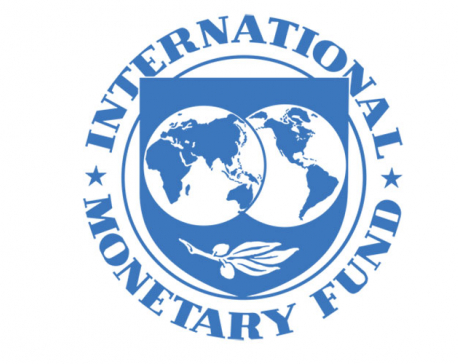
OR
IMF recommends Nepal to contain domestic demand pressures
Published On: October 20, 2019 11:02 AM NPT By: Republica | @RepublicaNepal

Senior IMF official calls for cautious fiscal policy
KATHMANDU, Oct 20: The International Monetary Fund (IMF) has recommended the government to contain domestic demand pressures in the country that would allow safeguarding external stability and to maintain financial sector stability.
Responding to a question of Republica following the Asia and Pacific Department Press Briefing held at Washington DC in the US during the 2019 IMF-World Bank Annual Meetings, Anne-Marie Gulde-Wolf, a deputy director at the IMF’s Asia and Pacific Department, said that the cautious fiscal policy and adequate macro-prudential measures were needed to address the excessive credit growth in Nepal.
The IMF has expressed concerns over the building of macroeconomic imbalances in the wake of higher-than-average growth in last few years.
After achieving an estimated growth rate of 7.1% in the last fiscal year – FY2018/19, the IMF projects the economy to expand by 6.3% in the current fiscal year – FY2019/20.
“Nepal has indeed seen very strong growth in the aftermath of the earthquake, in part related to the recovery and rebuilding efforts,” said Gulde-Wolf.
But macroeconomic imbalances are building up, she said, pointing out to the rise of inflation to 6% from 4.5%, the current account deficit in the range of 10% and declines in the foreign exchange reserves to cover the imports of five months down from more than 8 months two years earlier.
“Domestic demand remains very strong not least due to the very high credit growth in the range of 20%, raising concerns about financial sector stability,” she said, calling for measures to contain domestic demand pressures.
“For the medium-term Nepal needs to focus on improving human capital and physical infrastructure to enhance private investment,” she said. “It is also important to implement the ambitious fiscal federalism program in a way that is sustainable and avoids excessive costs from duplication in spending.”
You May Like This

Peak domestic demand for electricity posts record high of 2,316 MW on Sunday
KATHMANDU, July 1: The domestic demand for electricity reached a record high amount on Sunday with the Nepal Electricity Authority... Read More...

IMF recommends for policy-level precautions
KATHMANDU, May 10: The International Monetary Fund (IMF) has urged the government of Nepal to apply policy-level precautions stating that... Read More...

IMF projects economic growth at 6.5 percent
KATHMANDU, Dec 14: The International Monetary Fund (IMF) has made an upward revision to its forecast of Nepal’s economic growth... Read More...





Just In
- NRB introduces cautiously flexible measures to address ongoing slowdown in various economic sectors
- Forced Covid-19 cremations: is it too late for redemption?
- NRB to provide collateral-free loans to foreign employment seekers
- NEB to publish Grade 12 results next week
- Body handover begins; Relatives remain dissatisfied with insurance, compensation amount
- NC defers its plan to join Koshi govt
- NRB to review microfinance loan interest rate
- 134 dead in floods and landslides since onset of monsoon this year












Leave A Comment